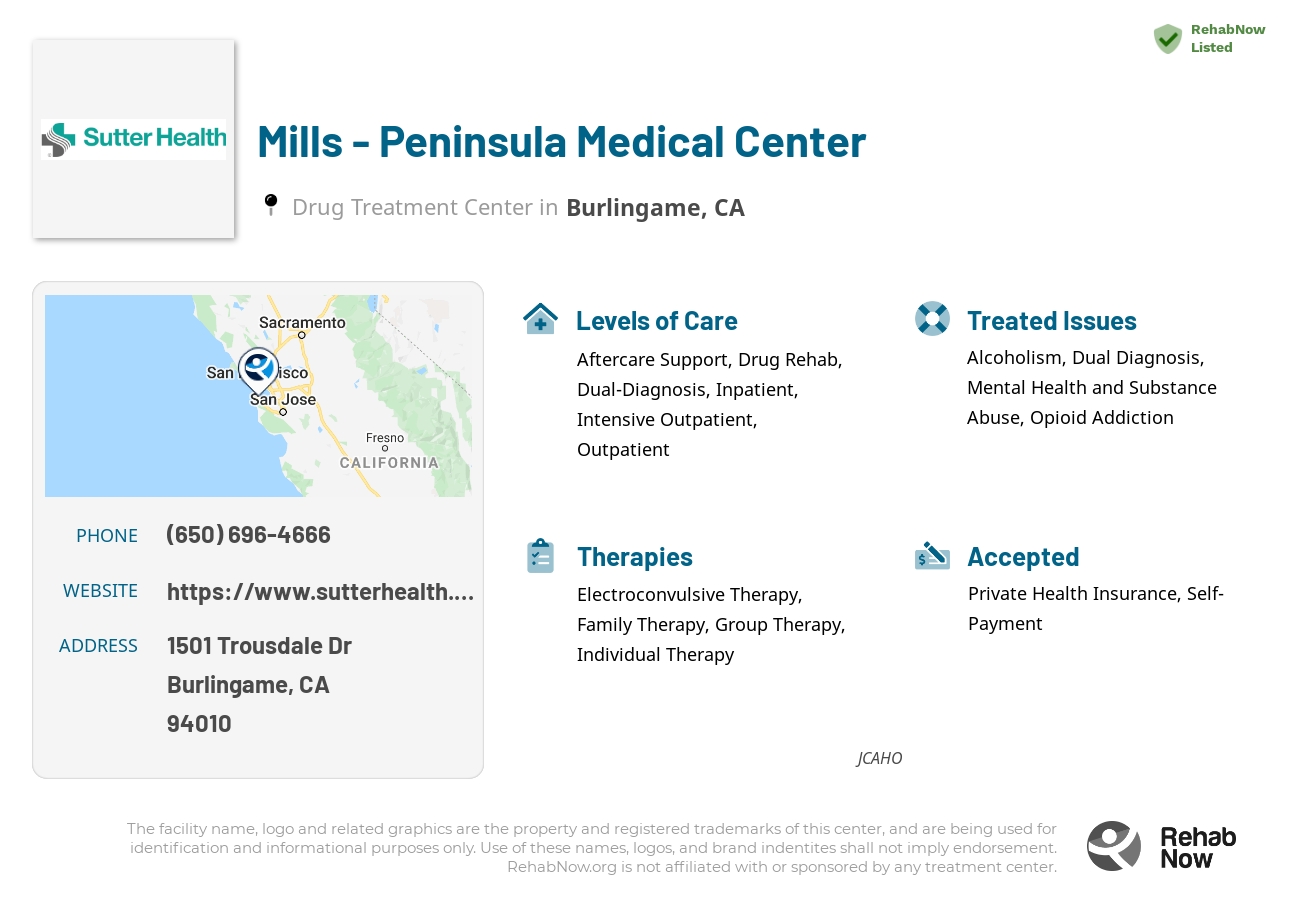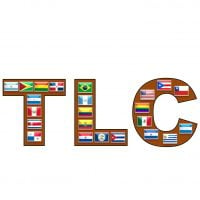Mills - Peninsula Medical Center
Drug Rehab Center in Burlingame, California
Mills - Peninsula Medical Center in Burlingame, California is a state-of-the-art addiction treatment facility that provides comprehensive services to treat patients with mental health and addiction issues, including aftercare support, drug rehab, dual-diagnosis, and various levels of care, while specializing in alcohol and opioid addiction and offering personalized and integrated care using traditional therapies and medication management.
About This Burlingame, CA Facility
Mills-Peninsula Medical Center, nestled in Burlingame, California, stands out as a beacon of hope for those struggling with addiction. This facility is deeply committed to providing a comprehensive range of services for individuals battling substance use disorder, alcohol use disorder, opioid use disorder, and other co-occurring mental health issues. Unique to Mills-Peninsula Medical Center is its incorporation into the Sutter Health network, offering state-of-the-art addiction treatment alongside personalized care plans.
- Comprehensive Care Spectrum: Offers everything from inpatient detoxification to outpatient treatment and specialized programs for different age groups.
- Personalized Treatment Plans: Every client receives a tailored treatment approach, ensuring a best-fit strategy for recovery.
- Specialized Programs for All Ages: Provides targeted support for children, teenagers, young adults, and the elderly, addressing each group's unique needs.
Mills-Peninsula Medical Center is proud to have earned accreditation from The Joint Commission, highlighting its commitment to the highest standard of patient care. This facility's diverse treatment options, including partial hospitalization and intensive outpatient programs, are designed to support individuals at every stage of their recovery journey.
The Center treats a wide range of addictions and issues using evidence-based methods such as cognitive behavioral therapy (CBT) and dialectical behavioral therapy (DBT). With the availability of inpatient treatment, clients can also benefit from electroconvulsive therapy (ECT), group and individual counseling, ensuring a holistic approach to recovery.
Genders
Ages
Modality
Additional
Accreditations

JCAHO
Conditions and Issues Treated
Addiction to prescription opioid painkillers like oxycodone and hydrocodone, and illicit opioids such as heroin, leads to potentially life-threatening withdrawal symptoms when discontinued. Opioid addiction treatment typically involves an inpatient stay at facilities like Mills - Peninsula Medical Center to make sure they get through withdrawal safely. Treatment also includes comprehensive mental health counseling.
Mental illness includes conditions such as anxiety, depression, schizophrenia, bipolar disorder. It can also happen that mental illness causes drug addiction and vice versa. Mills - Peninsula Medical Center in California knows it is vital to diagnose dual diagnosis or co-occurring disorder.
Levels of Care Offered
This center offers a variety of custom treatment tailored to individual recovery. Currently available are Aftercare Support, Detox, Drug Rehab, Dual-Diagnosis, Inpatient, Intensive Outpatient, Outpatient, Partial-Hospitalization, with additional therapies available as listed below.
One of the first things an addict should do when entering treatment is to abstain from using illicit drugs completely. Depending on the length of time that the person has been using, the addict may have to go through alcohol or drug withdrawal. Fortunately, detox doesn’t have to be done alone, and withdrawal symptoms can be managed medically in an inpatient or outpatient setting. While detox may be uncomfortable, it is not life-threatening. Detoxification allows the addict to rid the body of all traces of drugs or alcohol and gives the addict a clean slate for their recovery.
Inpatient programs are intensive regimes that require individuals suffering from serious addictions to admit themselves into a controlled environment. Inpatient programs in California generally span over 28 days to six months. The first step in an inpatient program is medically assisted detox. Doctors and addiction specialists at Mills - Peninsula Medical Center monitor the individual’s vital signs as the drugs leave their system. Some inpatient rehab programs also provide counseling for family members to provide encouragement and emotional support. In inpatient programs, patients have access to 24-hour medical supervision.
Daily trips to the hospital that provides the treatment include intensive outpatient services (IOP). IOP in California is appropriate for patients in residential recovery facilities that have been diagnosed with addiction. Patients return to their everyday lives gradually, increasing the likeliness of success in treatment.
To assist with alcohol or opioid abuse, or a co-occurring condition, Mills - Peninsula Medical Center offers an outpatient treatment program. For their rehabilitation and other services, the California patient will go to the treatment center, yet return home every night. After most of the program is completed, the level of mandatory participation reduces.
To protect those dealing with acute symptoms of addiction, a partial hospitalization program is ideal in the treatment process. This ensures that the person is cared for in a hospital-like environment in Burlingame, CA during the battle against drug addiction effects. Most PHPs need therapy for about six hours, at least three days a week.
Treatment is just a first step in sustaining sobriety. After rehabilitation, counseling for aftercare helps the person adapt to a life without drugs. A sober living facility in Burlingame, job therapy, or educational assistance may be included in this service, managed by Mills - Peninsula Medical Center. This is when a preventive strategy for relapse starts to take shape.
Mills - Peninsula Medical Center‘s Therapies & Programs
In addiction recovery at Mills - Peninsula Medical Center, therapy plays a significant role. This helps patients get to the root of their addiction and discover how the problems that contributed to their use can be handled better. Therapy can be performed in a group and one on one settings. The patient interacts with the therapist in a one-on-one atmosphere during individual therapy. This encourages them to reflect on the underlying addiction problems and develop ways to avoid potential future abuse.
Addiction and alcoholism affect the entire family. For this reason, family therapy is vital to a person’s recovery from addiction. In contrast to couples counseling, family therapy at Mills - Peninsula Medical Center may include siblings, children, parents, and other significant people in the recovering person’s life. Family support is one of the most important pillars of recovery.
Many people turn to drugs and alcohol as a way of processing trauma that has affected them in the past. Trauma can include abuse, neglect, the loss of a loved one and other unpleasant incidents. Trauma therapy at Mills - Peninsula Medical Center helps patients process trauma. It gives them the tools to deal with it in a healthier manner.
Dialectical behavioral therapy (DBT) is a type of Cognitive Behavioral Therapy that focuses on eliminating specific negative thoughts such as suicidal thoughts that can potentially lead to an individual inflicting self-harm. It is useful in the treatment of patients exhibiting uncontrollable emotions, intense mood swings, and borderline personality disorders.
The term “Dialectic” means the integration of opposites. In the substance abuse context, DBT refers to accepting the patient’s addiction and working to change their thoughts and behavior. It improves life skills such as controlling the intense emotions without reacting impulsively, resolving the interpersonal conflicts effectively, and promoting awareness about self and others.
It’s no surprise that diet is a crucial player in one’s well-being. What an individual puts into his or her body becomes the fuel that drives the mental and physical faculties to perform accordingly. Therefore, nutrition therapy, also known as medical nutrition therapy (MNT), guarantees that an individual is providing his or her mind and body with proper nourishment.
The right diet can improve a person’s general outlook, sleep habits, and thought processing skills. MNT also lowers the occurrence of chronic diseases such as adult-onset diabetes. Dieticians at Mills - Peninsula Medical Center in Burlingame, California believe that nutrition therapy is the key to making significant lifestyle changes, especially when it comes to personal care.Nicotine Replacement Therapy (NRTC) used products like skin patches and gum to deliver nicotine into the bloodstream of people trying to quit smoking. This helps break the habits associated with smoking. The very low doses of nicotine managed by Mills - Peninsula Medical Center prevent cravings while helping people make a gradual transition to complete smoking cessation.
Patient Experience
Creative Arts
For those combating addiction recovery in Burlingame, CA, creative arts therapy, or expressive therapy, is advantageous. Reading, music, theater, art, and other types of self-expression may be included. Mills - Peninsula Medical Center uses this to enhance the mental state of the patient and help them to focus on something other than addiction. It helps patients to explore how, through the creative process, their thoughts and emotions play out.
Experiential Therapy at Mills - Peninsula Medical Center
Experential therapy is a unique type of therapy that deals with the subconscious mind. This treatment available at Mills - Peninsula Medical Center in Burlingame, CA encourages individuals to work out their issues with their inner self through synchronous experiences.
This non-traditional treatment method makes use of the physique and encourages people to take part in various physical and emotional activities, movements, and practices. Some of the most common examples of experiential therapy are equine therapy, music therapy, adventure therapy, and role playing. Through these various methods, an individual is believed to heal from trauma, negative emotions, and hurtful memories faster. Moreover, experiential therapy is known to have enduring results which can be beneficial to sufferers.
Payment Options Accepted
For specific insurance or payment methods please contact us.
Is your insurance accepted?
Ask an expert, call (888) 674-0062
Additional Details
Specifics, location, and helpful extra information.
Burlingame, California 94010 Phone Number(650) 696-4666 Meta DetailsUpdated April 15, 2024
Staff Verified
Patient Reviews
There are no reviews yet. Be the first one to write one.
Burlingame, California Addiction Information
More than 3 million of California's citizens are addicted to illegal drugs. Almost 800,000 people use hard drugs, almost 5 million use marijuana, and another 2.1 million abuse alcohol every year. Other substance abuse issues such as binge drinking and teen drug use are also common. Many illegal drugs such as cocaine, heroin, methamphetamine, and marijuana are smuggled into the state from Mexico.
Treatment in Nearby Cities
- Santa Rosa, CA (61.4 mi.)
- El Centro, CA (508.5 mi.)
- Compton, CA (346.3 mi.)
- Turlock, CA (84.6 mi.)
- Rosemead, CA (342.6 mi.)
Centers near Mills - Peninsula Medical Center
The facility name, logo and brand are the property and registered trademarks of Mills - Peninsula Medical Center, and are being used for identification and informational purposes only. Use of these names, logos and brands shall not imply endorsement. RehabNow.org is not affiliated with or sponsored by Mills - Peninsula Medical Center.









